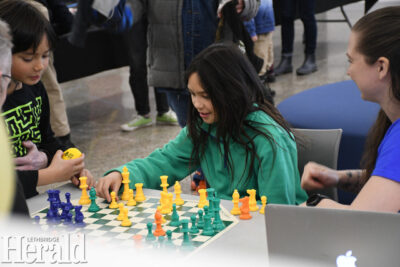Brain Awareness Week kicks off with open house
By Justin Seward - Lethbridge Herald on March 14, 2023.
 Herald photo by Justin Seward
Alana Luczak thinks out her move during a game of chess at the Chess for Life program table at the U of L's CCBN Open House over the weekend.
Herald photo by Justin Seward
Alana Luczak thinks out her move during a game of chess at the Chess for Life program table at the U of L's CCBN Open House over the weekend.The University of Lethbridge held a Saturday open house for the public to learn more about the brain and the world-renowned research being done at the Canadian Centre for Behavioral Neuroscience.
The open house was conducted ahead of Brain Awareness Week which started Monday.
“It’s really an opportunity for the community to come and see the research that happens here at the University of Lethbridge,” said Cameron Beazer, open house co-organizer.
“We’ve got a world class institution – the Canadian Centre for Behavioral Neuroscience here – and just some phenomenal professors and researchers. And it’s an opportunity for everyone to see just the groundbreaking research that happens here.”
Beazer said brain awareness is so important just because it’s really a developing field.
“Neuroscience is a very quickly developing field,” said Beazer.
“We’re learning new things every year about our brain, about how it works and about how we can take care of it. So, it’s really important for all of us here in the community and in the world to know what those things are, right, to learn those just as much as the scientific community is. So that’s what Brain Awareness Week is all about.”
Open house attendees had the opportunity to go on guided tours of the neuroscience department labs and there were booths set up from brain-related local community organizations.
“Some of them have games for kids and one of my favourite parts about today is the kid’s room,” said Beazer.
“We’ve got a bunch of different activities set up for kids to come and make their own brain out of Play Doh, or they can come and look at some real brains and do a lot of different events there that not only help them have fun but able to learn about what the brain is and how it works.”
Jade Oldfield was an open house organizer and is a current graduate student in the neuroscience department and focuses on the Chess for Life Progam.
Chess for Life is a unique restorative justice program that was accepted by Alberta Justice to be an alternative sentence for youth.
Youth come to the U of L for 25 hours of chess instruction as a part of their community service and down the road leave with much more.
“We were donated some funding to researching the reasons why the program has been so successful from 2016 until now,” said Oldfield.
“So, my lab, the (Dr. Robbin) Gibb lab, in conjunction with Dr. Lance Grigg, who has created and organized the Chess for Life program, we have been working on testing whether or not youth executive functions … are being improved and what are making the youth so successful after participating in the program.”
The youth are talked to about space time and harmony, where their life is thought about through a chess game.
“You have to learn to think long term in terms of that time and that space,” said Oldfield.
“You have to use your space effectively and you need to be able to work together with other players essentially and other pieces on the chess board. So essentially the idea is that the executive functions that are required to successfully play chess, are also those that we need to be successful in our everyday lives.”
19-18




